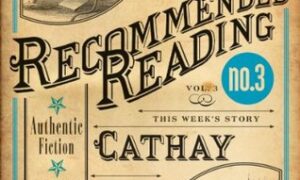 We Can Only Save Ourselves by Alison Wisdom
We Can Only Save Ourselves by Alison Wisdom
My rating: 3/5 cats



this one didn’t wow me. it felt like a megan abbott book with all the tastiest morsels strained out of it, leaving only the thin broth behind.
it’s about a good teenaged girl from a good neighborhood who falls under the sway of a charismatic older man and runs away to live with him and a handful of equally-besotted girls in a hippie-harem where he proceeds to strip them of their names and expand their narrow worldviews with sex and drugs and stories of the coming apocalypse that they alone will survive and be like gods in the wasteland or whatever, eventually inciting them to acts of violence to help bring it about. also, he plays guitar.
but even though one of his (former) girls was (re)named sadie, this is not charles manson, it’s a guy named wesley. and wesley plucks alice from suburbia, willingly leaving her family and friends behind, and feeling only a little bit guilty about the emotional devastation she’s setting in motion.
the device of being narrated in large chunks by the collective we/us chorus of the neighborhood’s mothers bemoaning the loss of alice from their lives bugged me because i couldn’t help but compare it (unfavorably) to the virgin suicides, and because it felt claustrophobic and obsessive—like, don’t these ladies have anything better to do than fixate on this teenage girl and extol her beyond all reason?
We missed Alice right away. There are some people in our lives whose absence might go unnoticed for days: the freckled woman who bagged groceries at the store, the crossing guard at the intersection by the elementary school. Bot not noticing Alice was gone—it would be like walking outside and not noticing that all the trees had disappeared, leaving our world without respite from the sun, without clean air to breathe, without beauty. She was special, yes, but she also made everyone around her special too. And it wasn’t simply that we felt special. We became special. We were transformed.
this can be sort of accepted if you interpret that she is not alice, she is Symbol—she is standing in for all lost innocence, squandered potential, all the children grown away from their clutches, and her perfection is inflated in memory because it is no longer there to admire.
i mean, maybe. because even before she disappears, there’s a lot of time spent on everyone’s preoccupation with her—how beautiful, how smart, how good and kind, and she exhibits all the confidence of someone who has been told their entire life that they’re special. she’s been primed for worship, which is its own trap, because, bolstered by this belief, when faced with her first real social disappointment, alice reacts by committing an act of vandalism that leaves the town aghast before running off with a man prepared to nurture her idea of her innate specialness by assuring her it’s not only real, it’s even bigger than she’d understood.
‘course, alice is no more alice to wesley than she is to her former neighbors and classmates. she’s something to refine, reshape, exploit; a vessel for his ideologies and his penis to fill.
i liked the beginning of the book—i thought she captured alice’s restlessness; the nameless yearning of an adolescent female impatient for her life to begin. and there were moments of very megan abbott-y prose:
Below the bleachers, spanning the length of the gym, the cheerleaders, Alice among them, stood in an evenly spaced line and clapped and bounced. They raised their voices in a rallying cry. They would fight and prevail, Alice yelled and chanted with the other ponytailed girls, unable to hear her own voice over the roar they made together. The man hadn’t been on the sidewalk that morning after all, and the wanting inside her had yawned and stretched, but now it was filled with applause and drums and girls standing beside her. They looked at each other and smiled. Look at the frenzy they could whip up with their bodies, their voices. Look at the wildness. What else was there to want when you had all this power?
i even understand why alice was drawn to wesley at first; he flattered her, he’d been places, and wherever he went, people were drawn to him, but once she was installed in that house, once there was so much competition for his affections, once things…escalated…what kept her there? i understand how cults work, i understand how people like charles manson groomed his followers and got them to commit violent acts, but alice doesn’t seem to be the type, doesn’t seem to have the temperament for it. she has her romantic notion of signs, and her belief that she was meant for big things, away from the small minds and ambitions of where she grew up, but i never felt convinced, reading this, that alice would have tolerated being one-paramour-among-many, let alone thrived in those circumstances. once the girls settle into their roles in the house, with their odd friendships and small defiances against wesley, the competitive aspect fades, but alice’s transition into their ranks seemed too smooth for her personality.
and, frankly, i never understood what made wesley so goldang special. or her, for that matter.
back to the chorus element, because it really did bug me—i never understood its purpose, what it was meant to contribute to the story, other than paralleling suburban life and expectations with cult livin’. the voices were too-knowing, commenting on alice’s life away as though they were witnesses to it; some all-seeing entity:
Alice closed her eyes and let herself think of us. (She was so far away now. When she thought of us, we always tried to call her name, as if our voices could bring her back.)
it wasn’t a bad idea, just executed a little clumsily. the ‘when’ of this also bothered me; the not knowing when this took place, other than a vaguely distant postwar american past, anytime USA.
overall, i thought it was fine. the characters of the other girls—particularly apple and kathryn—made for interesting dynamics, i love stories of female rage and this one definitely goes dark, and i thought some of the writing was excellent. i just wasn’t entirely convinced by alice’s transformation, i didn’t feel wesley’s magnetism was there on the page, and did i mention that the chorus element cheesed me off?
still, a strong debut.
read my book reviews on goodreads







